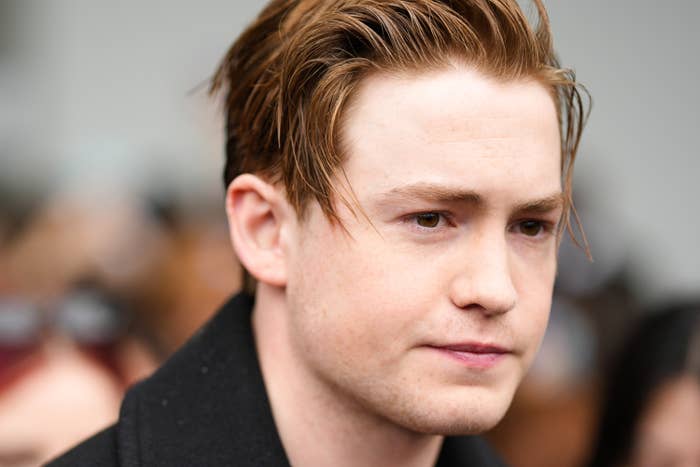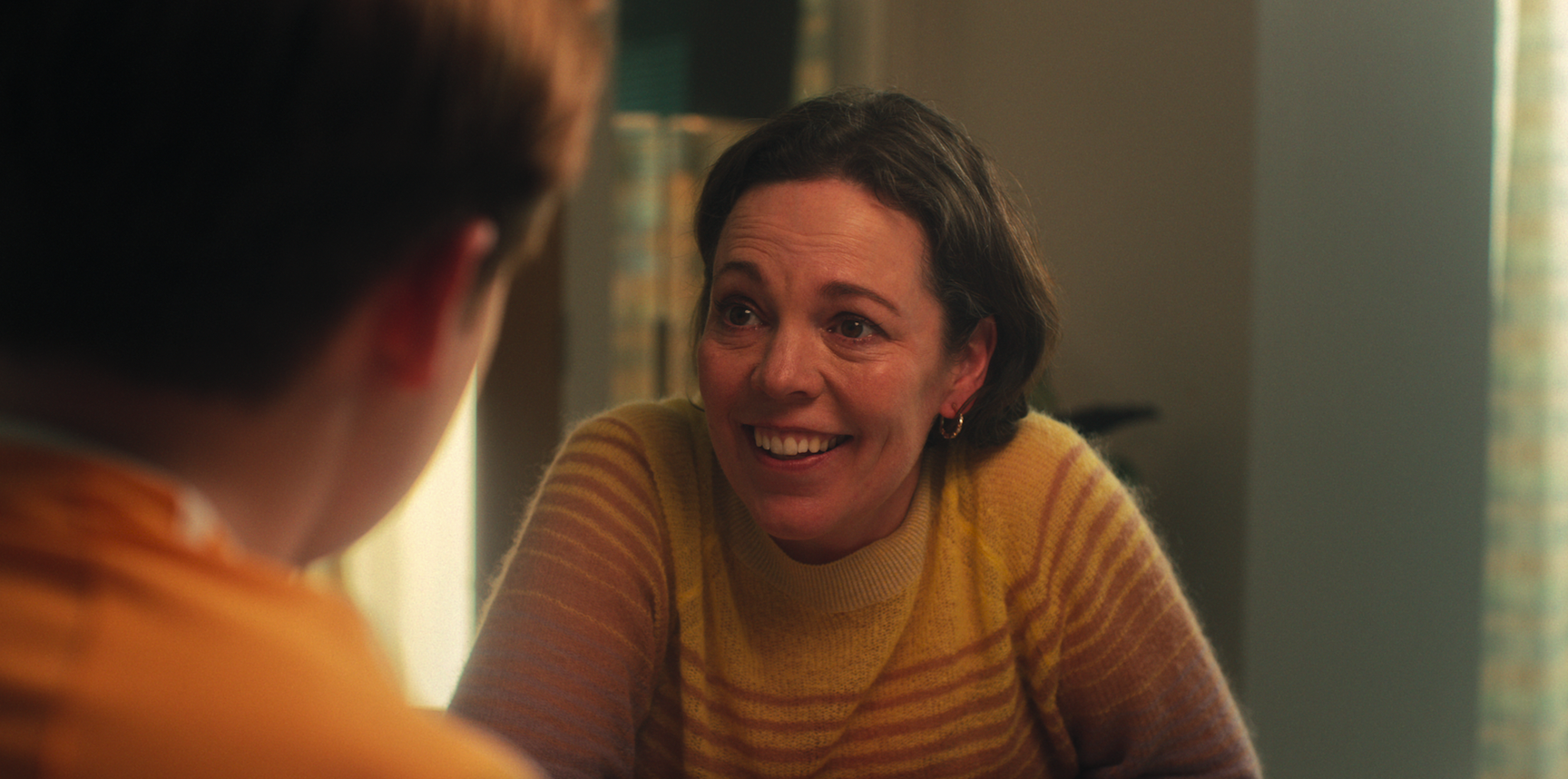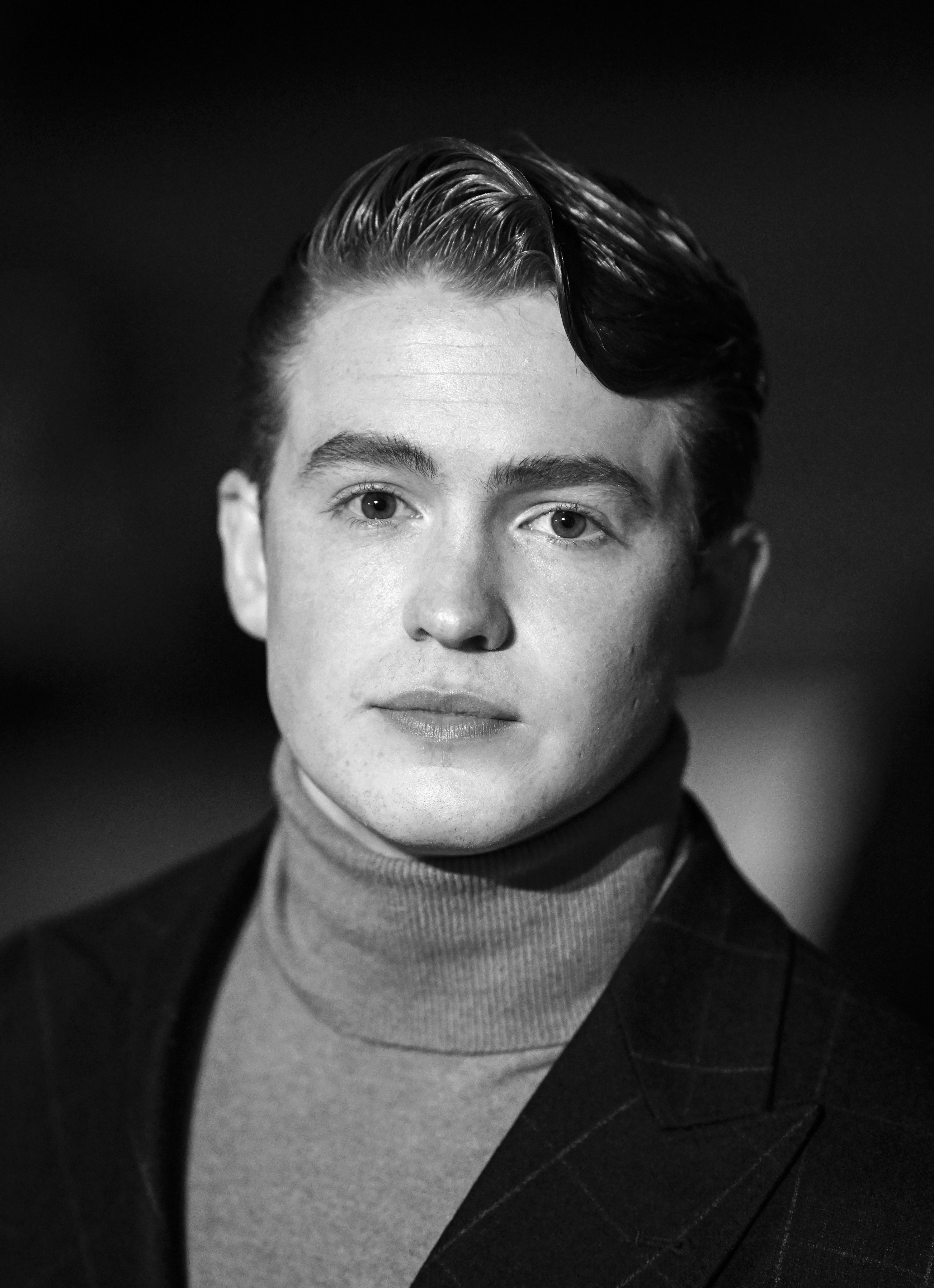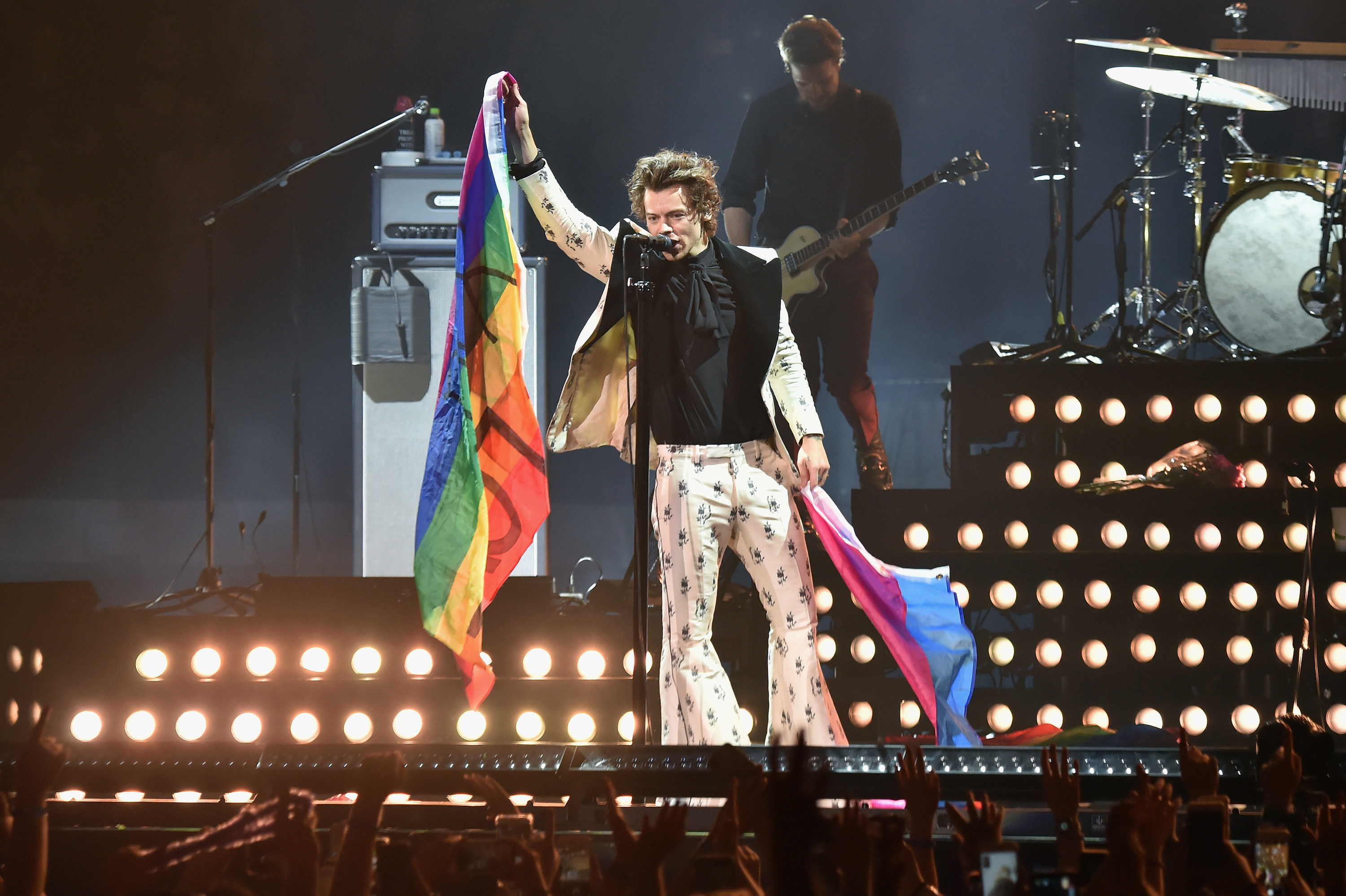
There’s a scene at the end of Netflix’s gay coming-of-age hit Heartstopper that will tug at the heartstrings of anyone who has ever had to come out of the closet.
High school rugby star Nick Nelson (Kit Connor) has already privately accepted his bisexuality and found happiness in a relationship with Charlie Spring (Joe Locke). They’ve spent the day at a rocky English beach, declaring themselves boyfriends and embracing after a season of “will-they-won't-they” G-rated drama.
Now, all that’s left to do is for Nick to tell his mother.
When he arrives back home, his mother, Sarah (played in a casting coup by Oscar winner Olivia Colman), instantly remarks on his happiness. Nick pauses for a moment in the kitchen as he makes a cup of tea, deciding the time is now. Sitting down next to her at a table, he struggles to find the words and summon the courage. She looks up from her iPad and leans over to him, sensing that her son is grappling with something big.
“Charlie’s my boyfriend,” Nick confesses breathlessly. “I still like girls, but I like boys too. And me and Charlie, we’re going out, and I just wanted you to know.”
Nick’s mother doesn’t interrupt him, nor does she let the silence linger. She listens intently and nods with a little smile. Then, when he does finish confiding in her, she does the best thing any parent can do in that moment of shared revelation: She embraces him wholeheartedly and without reservation.
“Oh, baby,” Sarah says warmly as she gets up from her chair to hug her son. “Thank you for telling me. I’m sorry if I ever made you feel like you couldn’t tell me that.”
The climactic scene is the ideal scenario — not least because coming out to a gay icon like Colman must feel like a fever dream. It’s taken eight episodes for Nick to learn who he is and who he isn’t. No one has forced him out. He’s able to tell his mother when he is good and ready — on his own terms.

Connor, the actor who plays Nick, was not so lucky.
On Monday night, the 18-year-old actor came out as bisexual in a terse and angry tweet. "Back for a minute," Connor wrote in his first post on the platform in seven weeks. "I’m bi. Congrats for forcing an 18-year-old to out himself. I think some of you missed the point of the show. Bye."
Connor had abandoned the social media platform in September after he was spotted in Paris holding hands with Maia Reficco, his costar in the upcoming adaptation of YA novel A Cuban Girl’s Guide to Tea and Tomorrow. After starring in a show about two boys falling in love, and then attending Pride events with his costars, some Twitter users accused Connor of queerbaiting or “projecting himself in a queer way.” Some even demanded he leave Heartstopper altogether.
Since Heartstopper dropped on Netflix in April, Connor has complained that he and costar Locke had been under pressure to publicly discuss their sexuality. "We’re still all so young," Connor told the Reign With Josh Smith podcast in May, adding that he felt uncomfortable with people “speculating about our sexualities and maybe pressuring us to come out when maybe we’re not ready.”
In that same interview, Connor revealed he’d been troubled by fans trying to guess his sexuality based on things like his voice or appearance. He said he also struggled to ignore the few mean comments he was seeing online.
“For me, I just feel perfectly confident and comfortable with my sexuality,” Connor said. “But I don’t feel the need to really, you know — I’m not too big on labels and things like that. I’m not massive about that. I don’t feel like I need to label myself, especially not publicly.”
Connor’s forced coming-out has sparked yet another conversation about queerbaiting and actors’ authenticity.
First, it apparently needs to be said that actors are actors and characters are characters.
Yes, some people in the LGBTQ community have said that gay characters should be played exclusively by gay actors, but this has stemmed from a desire to level the playing field for LGBTQ performers. (And to reduce the number of roles being played by James Corden…OK, I’m kidding, but maybe not.) Even Russell T. Davies, the creator of gay dramas Queer as Folk and It’s a Sin, who has declared “war” on straight actors in queer roles, has said the issue is one of equity, not authenticity. “It is not a fair playing field,” Davies told the New York Times last year. “The equality notion is based on 50 percent this way, 50 percent that way. But 90 percent of actors are straight and 10 percent of parts are gay.”
Entertainment creators should find more equitable opportunities for LGBTQ performers given that, according to LGBTQ media monitoring group GLAAD, 88.1% of TV roles are heterosexual characters. Entertainment consumers also need to do better in accepting these performers in straight roles.
But an audience pressuring a young actor to out himself in order to remain on an LGBTQ show is not progress, nor is it equity. These stars deserve a private life as much as anyone else, especially if they are young. They can come out at 15 or 50. They can never come out at all. It is, quite literally, none of our business — all the more so if they have already indicated in interviews that they have no desire to do so publicly.

Second, we need to be much more precise with “queerbaiting,” a term the Oxford English Dictionary only added last year, but which has evolved over time. The earliest citation of the word dates back to 1956 and refers to the witch hunt or abuse against LGBTQ people. But by the time it began being used in online fandoms during the 2010s, its meaning had changed to “the practice of trying to appeal to and capitalize on LGBTQ audiences or customers in a deceptive or superficial manner.” The OED researchers found the first use of this meaning in a 2012 Tumblr comment about the Supernatural characters Dean and Castiel.
In order to lure in queer consumers, these companies and creators will suggest the promise of queer content using homoeroticism or suggestive marketing, but they have no intention of actually delivering. Such complaints have been made, unfairly or not, against shows like Sherlock, Rizzoli & Isles, and Supernatural, when viewers felt that sexual tension between same-sex characters ultimately went nowhere. "They're falsely leading us on," Ohio University professor of media and women and gender studies told the BBC in 2019. "Viewers feel misled... making us think you're actually going to deliver a satisfying narrative but it doesn't turn out."
Many celebrities and performers have also been accused of queerbaiting. Hungry for more powerful queer stars to hold up as role models, LGBTQ fans have expressed anger and hurt when a high-profile person implies queer sexual desire during, for example, a promotion cycle, because it feels like a ploy for attention rather than an expression of solidarity. In addition, stars who did come out as queer in earlier times risked their careers and own safety by doing so; for some LGBTQ people, gesturing at the idea of being queer is inconsiderate at best and offensive at worst.
Some people criticized Nick Jonas’s penchant in the early to mid-2010s for posing provocatively, stripping in gay bars, or appearing in LGBTQ magazines as textbook celebrity queerbaiting. Here was a straight man — and former poster child for purity rings, no less — doing everything he could to make himself a sexual object to gay men. There was just one problem: I can assure you (from personal experience) that he already was one, just like how lesbians embrace Cate Blanchett. Jonas, to his credit, was simply recognizing an audience that already existed. He never promised to actually sleep with any men.
As the LGBTQ community has found itself increasingly accepted by the public at large, we shouldn’t be surprised that celebrities will want to align themselves with us or even dabble with queer culture.
Still, there is a difference between people play-acting as queer and those who are just embracing or experimenting with queer culture, although it is admittedly a nuanced one. When Madonna and Britney Spears kissed on stage at the 2003 VMAs, it was a memorable, powerful moment, but was it queer when neither of them have ever publicly identified as such? Was Katy Perry appealing to queer women or straight men when she sang about kissing a girl and liking it, years before openly discussing her sexual fluidity?
Ditto for Harry Styles, who has in his recent concert tour wrapped himself in Pride flags and reacted positively to a “Daddy?” sign, prompting accusations of queerbaiting. But as he told Rolling Stone in August, none of these critics have any real sense of what his real life is like. “Sometimes people say, ‘You’ve only publicly been with women,’ and I don’t think I’ve publicly been with anyone,” Styles said. “If someone takes a picture of you with someone, it doesn’t mean you’re choosing to have a public relationship or something.”

A star simply living their life is not queerbaiting, particularly if you can’t seem to wrap your head around the concept that they may be bisexual. For many people, sexuality can be a deeply private journey, and it makes sense in the era of rampant social media that a celebrity grappling with their own identity might not be ready to make an announcement about it. Nobody ever knows what is happening in another person’s life, and we can’t make assumptions about it either.
A star simply living their life is not queerbaiting, particularly if you can’t seem to wrap your head around the concept that they may be bisexual.
Which brings us back to Kit Connor. As someone who came out well into my college years, I can’t imagine the scrutiny and pressure he was under as a newly famous 18-year-old who felt as if he were angering fans by not doing so. He has been robbed of the right to his own journey, and I feel immense sympathy for him.
“Real people — let alone literal teenagers — don’t owe a baiting public anything, and the arrogance to believe you have a right to someone’s personal life is shameful,” tweeted bisexual writer Lucy Ford, who covers pop culture for British GQ. “Queerbaiting is for fictional characters and creators literally trying to actively profit off of LGBTQ fans. Real people existing in public space and navigating how much they want to share while providing art that others may or may not feel safe by aren’t doing that.”
So to Kit, on the odd chance you’re reading this, let me just say, welcome to the community. I’m glad you’re here. To paraphrase that quote from Heartstopper: Thank you for telling us. I’m sorry that people made you feel you had to. ●
